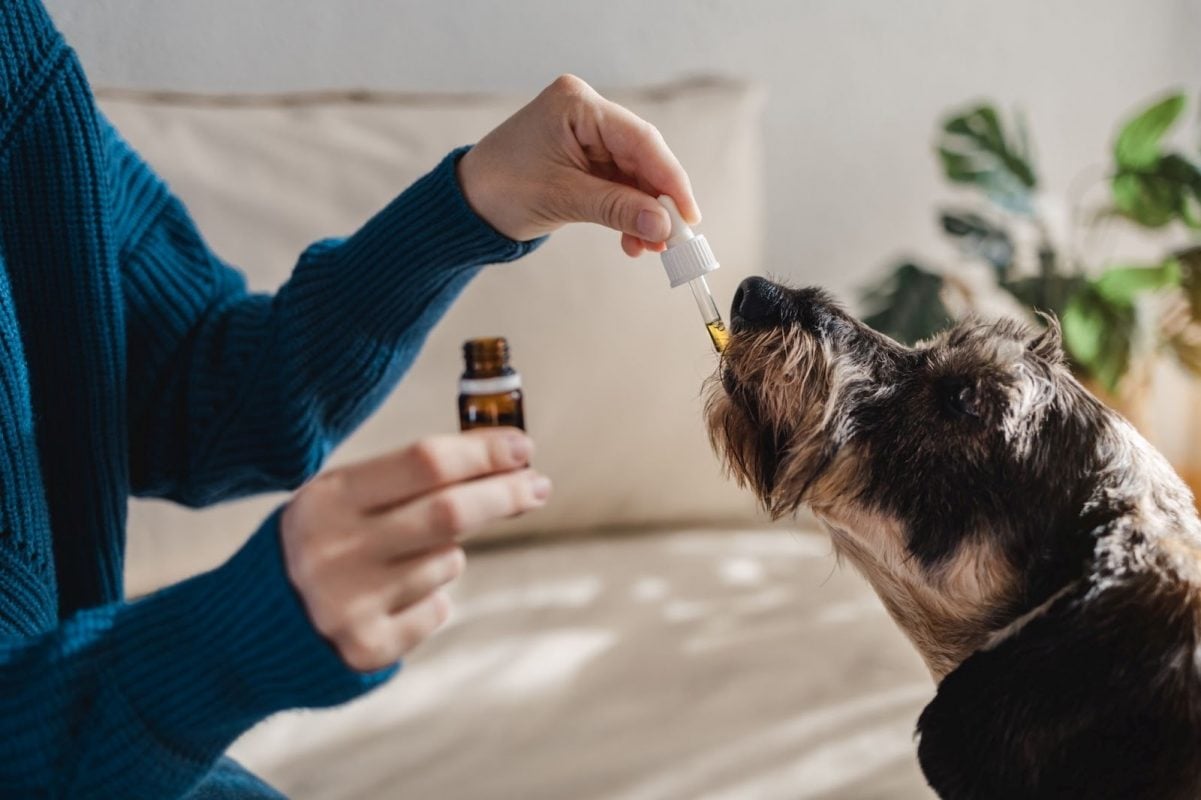Cannabis
Guide to Cannabis for Pets
Cannabis has been a topic of increasing interest in the world of veterinary medicine. Pet owners are turning to cannabis-based products to address various health issues in their furry companions. In this guide, we explore the key aspects of using cannabis for pets, including cannabinoids, dosages, potential benefits, and important considerations for pet parents.
Can I give my pet any cannabis product for their health?
No, not all cannabis products are safe for pets. It’s crucial to use specially formulated pet-friendly products, typically derived from hemp and containing minimal THC. Always consult with a veterinary professional before introducing any cannabis-based supplement to your pet’s routine.
Cannabis and Cannabinoids
What are Cannabinoids?
Cannabinoids are chemical compounds found in the cannabis plant. They interact with the body’s endocannabinoid system, a complex cell-signaling system that plays a role in regulating bodily functions. Two major cannabinoids are tetrahydrocannabinol (THC) and cannabidiol (CBD).
The Endocannabinoid System in Animals
Like humans, animals have an endocannabinoid system with cannabinoid receptors. These receptors are found throughout the body and play a crucial role in maintaining balance in various bodily functions, including immune response, neurological function, and inflammatory response.
Explore weed products for people
What Cannabis Products Can Be Used For Pets?
1. CBD Oil for Pets
CBD oil is one of the most popular and versatile cannabis products for pets. Derived from hemp, it contains minimal THC, avoiding psychoactive effects. CBD interacts with the endocannabinoid system, potentially providing relief from pain, anxiety, and inflammation. Administered orally, it’s available in various concentrations, allowing pet owners to adjust dosage based on their pets’ needs.
2. CBD Treats
CBD-infused treats offer a tasty and convenient way to administer cannabidiol to pets. These treats come in various flavors and sizes, making them a preferred choice for pet owners who want to combine the benefits of CBD with a treat format. Dosages are often clearly indicated, allowing for precise control over the amount of CBD given.
3. CBD Capsules
CBD capsules provide a measured dose of CBD, ensuring accurate and consistent administration. This format is suitable for pets that may not enjoy the taste of oil or treats. Capsules are easy to incorporate into a pet’s routine, making them a convenient option for pet owners seeking a fuss-free way to provide the benefits of CBD.
4. CBD Topicals
CBD-infused balms, creams, or salves can be applied topically to target specific areas of discomfort or skin issues. While not commonly used for internal conditions, topicals may provide localized relief for conditions like dermatitis, arthritis, or sore muscles. Pet owners can directly apply these products to the affected area, allowing for targeted relief.
5. CBD-Infused Pet Food
Some pet food manufacturers offer CBD-infused options, incorporating cannabidiol into treats, kibble, or wet food. This allows pet owners to seamlessly integrate CBD into their pets’ regular diet. It’s essential to check the dosage per serving to ensure accurate administration and monitor how the pet responds to the infused food.
6. Hemp Seed Products
Hemp seed products, such as hemp seed oil, provide a source of omega-3 and omega-6 fatty acids, which contribute to skin and coat health. While not as rich in cannabinoids as CBD, hemp seed products can offer nutritional benefits. Pet owners may use these products as a supplement to support overall well-being.
7. CBD-Infused Coconut Oil
Combining the benefits of CBD with the nutritional properties of coconut oil, CBD-infused coconut oil can be administered orally or added to pet food. Coconut oil is known for its potential antibacterial and antiviral properties, making it a versatile option for pet owners seeking a holistic supplement for their pets.
8. Hemp-Based Supplements
Hemp-based supplements often contain a combination of cannabinoids, terpenes, and other beneficial compounds found in the hemp plant. These supplements aim to provide a broader spectrum of potential benefits, including anti-inflammatory and antioxidant properties. They may come in various forms, such as capsules, powders, or liquid extracts.
9. CBD-Infused Pet Shampoos
Designed for external use, CBD-infused pet shampoos can offer relief for pets dealing with skin conditions or allergies. The anti-inflammatory properties of CBD may help soothe irritated skin, and the act of grooming can provide a calming effect. Pet owners can use these shampoos as part of their pets’ regular grooming routine.
10. Hemp-Derived Pet Products
Beyond CBD-specific products, various hemp-derived pet products, including toys and bedding, are infused with hemp fibers or extracts. While not necessarily medicinal, these products may contribute to a pet’s overall well-being, offering a natural and sustainable alternative to conventional pet products.
Before incorporating any cannabis product into a pet’s routine, pet owners must consult with a veterinary professional to determine the appropriate product, dosage, and potential benefits for their specific pet’s needs. Monitoring for any adverse effects and adjusting the dosage as needed ensures a safe and effective integration of cannabis products into a pet’s health care regimen.
Potential Benefits of Marijuana for Pets
Medical Benefits
Cannabis products for pets are believed to offer a range of therapeutic advantages based on anecdotal evidence. These potential benefits encompass pain relief, addressing anxiety, and contributing to an overall improvement in the pet’s quality of life. As pet owners explore alternative treatments, the potential medicinal benefits of cannabis products become an intriguing avenue for enhancing the well-being of their furry companions.
Chronic Pain and Joint Health
In the realm of managing chronic pain in pets, cannabis exhibits promise, particularly in alleviating joint pain associated with conditions like arthritis. The anti-inflammatory properties inherent in cannabinoids are thought to play a crucial role in enhancing joint health, potentially providing relief for pets grappling with long-term pain issues.
Anxiety and Behavioral Issues
Cannabis products, particularly those rich in CBD, emerge as a holistic option for pets facing anxiety or behavioral issues. CBD has been associated with inducing relaxation in animals without inducing sedation. This makes it a compelling option for pet owners seeking natural remedies to address their pets’ stress or behavioral challenges, offering a potential solution that promotes calmness without compromising the pet’s alertness.
Inflammatory Bowel Disease and Other Conditions
Beyond anxiety and pain relief, cannabis may hold benefits for pets dealing with inflammatory bowel disease and various other medical conditions. While anecdotal evidence suggests positive outcomes, pet owners must collaborate with veterinary professionals.
Consulting with a vet ensures a tailored approach, maximizing the potential benefits while addressing specific health conditions in a safe and informed manner. This collaborative effort between pet owners and professionals fosters a comprehensive approach to pet healthcare, responsibly incorporating alternative options like cannabis.
Potential Side Effects and Considerations
- Adverse Effects and Signs of Toxicosis: While cannabis products for pets are generally considered safe, there can be potential side effects. Signs of toxicosis in dogs may include lethargy, dilated pupils, and a slow heart rate. If any adverse reactions occur, it’s crucial to seek veterinary attention promptly.
- Common Signs of Excess Cannabis Exposure: Excess cannabis exposure in pets may lead to symptoms such as light sensitivity, increased production of saliva, and changes in body temperature. Monitoring these signs is essential for pet parents to ensure their companion animals’ well-being.
- Legal Standpoint and Product Quality: Pet owners should source high-quality hemp-derived products from reputable manufacturers. The legal status of cannabis varies by location, so it’s essential to stay informed about local regulations.
How Do You Determine the Correct Cannabis Dosage For Your Pet?
Determining the right dosage is essential for the safe and effective use of cannabis products in pets. Dosages often depend on factors such as the pet’s weight, the specific product used, and the severity of the condition being treated.
Pet owners should start with a low dose and gradually increase it while monitoring their pet’s response. The optimal dose varies for each animal, and finding the right balance is crucial to avoid adverse reactions. Considerations such as the pet’s activity level, age, and overall health should influence the dosage. It’s also important to note that the same dose might affect different animals differently.
Buy Cannabis Products Online
Nupep Shrooms offers a diverse range of cannabis products tailored for human consumption. While we don’t specialize in cannabis for pets, our selection is extensive, catering to a variety of preferences and needs. From premium cannabis flowers and edibles to innovative vape pens, Nupep Shrooms prioritizes delivering high-quality options for individuals seeking the potential benefits of cannabis.
With a commitment to quality and variety, we ensure that our array of products meets the diverse requirements of our human clientele, providing a reliable source for those exploring cannabis for personal wellness and enjoyment.
Explore our range of cannabis products
Frequently Asked Questions
Cannabis, particularly CBD, may offer benefits such as pain relief, anxiety reduction, and improved overall well-being in pets. It has shown promise in managing conditions like chronic pain, arthritis, anxiety, and inflammatory diseases. However, individual responses can vary, and consultation with a vet is essential for tailored recommendations.t.
Pet owners should monitor for signs of adverse effects, including lethargy, changes in behavior, or gastrointestinal issues. It’s crucial to start with low doses and gradually increase while observing your pet’s response. Consult with a veterinary professional to ensure proper dosages and to address any concerns about potential interactions with existing medications.

